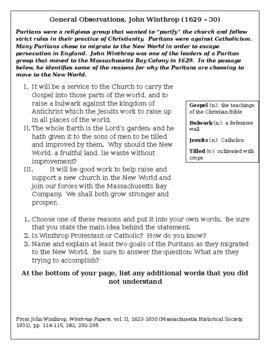Introduction:

John Winthrop, the renowned Puritan leader and first governor of the Massachusetts Bay Colony, penned a profound observation in May 1629 that has shaped American thought and society for centuries. His words, recorded in his journal, provide invaluable insights into the founding principles and aspirations of the colony. This article delves into Winthrop’s observation, analyzing its significance and exploring its lasting legacy and implications.
Winthrop’s Observation:
In a sermon delivered on May 17, 1629, Winthrop eloquently articulated his vision for the new colony:
“We must consider that we shall be as a city upon a hill. The eyes of all people are upon us. So that if we deal falsely with our God in this work we have undertaken, and so cause Him to withdraw His present help from us, we shall be made a story and a byword through the world.”
Key Elements of the Observation:
-
Symbolism of the “City on a Hill”: Winthrop’s metaphor of a “city on a hill” symbolizes the Puritan belief that the colony would serve as a shining example of Christian faith and virtue.
-
Recognition of Public Scrutiny: He acknowledged that the actions of the colonists would be under constant scrutiny by both the indigenous inhabitants of the land and the wider European world.
-
Responsibility to God: Winthrop emphasized the importance of upholding God’s principles and fulfilling the divine purpose for the colony.
-
Consequences of Failure: He warned that any deviation from these ideals would result in divine retribution and public ridicule.
Historical Significance:
Winthrop’s observation played a pivotal role in shaping the identity and trajectory of the Massachusetts Bay Colony.
-
Foundation of American Exceptionalism: It reinforced the belief among the colonists that they were a chosen people, destined to create a virtuous society that would inspire the world.
-
Inspiration for Puritan Social Policy: Winthrop’s words influenced the colony’s strict moral codes, laws, and social institutions, which aimed to promote piety and conformity.
-
Basis for American Civic Religion: The “city on a hill” metaphor became a cornerstone of American civic religion, linking religious faith to national identity.
Contemporary Implications:
Winthrop’s observation continues to resonate with Americans today.
-
Responsibility of Public Leaders: It serves as a reminder to public figures that their actions have a profound impact on society and history.
-
Importance of Moral Values: Winthrop’s emphasis on virtue and accountability challenges us to uphold ethical standards in our own lives and communities.
-
Role of Citizen Activism: The observation inspires citizens to hold their leaders accountable and strive to create a more just and equitable society.
Applications in Modern Society:
Winthrop’s observation can inspire innovative applications and solutions in various fields.
Table 1: Applications of Winthrop’s Observation in Modern Society
| Field | Application |
|---|---|
| Education | Promoting ethical decision-making and civic responsibility through education programs. |
| Business | Emphasizing corporate social responsibility and transparency in business practices. |
| Government | Establishing policies and regulations that prioritize accountability and public scrutiny. |
| Technology | Developing technologies that empower citizens to participate in decision-making and hold leaders accountable. |
Strategies for Implementing Winthrop’s Principles:
- Encourage Public Dialogue: Foster open and respectful dialogue about the role of ethics and accountability in society.
- Promote Civic Education: Integrate Winthrop’s observation into civics education programs to instill a sense of responsibility in future generations.
- Strengthen Public Oversight: Establish mechanisms for independent oversight of public institutions and officials.
- Support Citizen Activism: Facilitate citizen involvement in decision-making processes and provide platforms for public engagement.
Tips and Tricks for Upholding Winthrop’s Vision:
- Lead by Example: Public figures should set a high moral standard for others to follow.
- Foster a Culture of Accountability: Encourage open and honest dialogue, and hold individuals accountable for their actions.
- Encourage Civic Participation: Create opportunities for citizens to participate in public discourse and decision-making.
- Practice Humility: Be willing to admit mistakes and learn from them.
Conclusion:
John Winthrop’s observation of May 1629 remains a timeless testament to the enduring themes of responsibility, accountability, and the aspiration to create an exemplary society. By reflecting on his words and applying their principles to modern challenges, we can strive to build a more just, equitable, and inspiring nation for ourselves and future generations.
